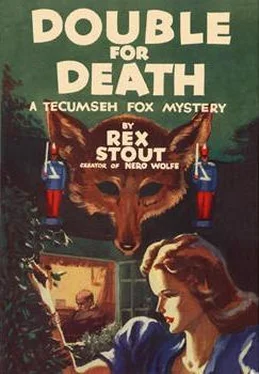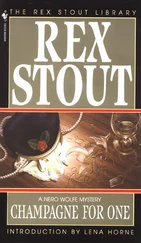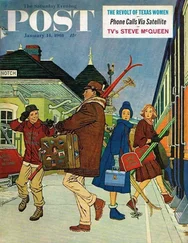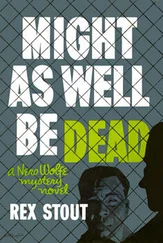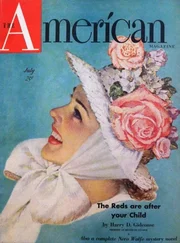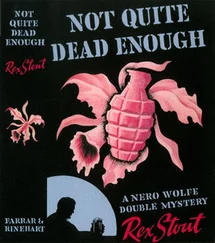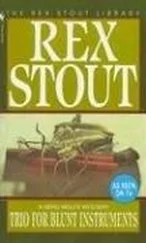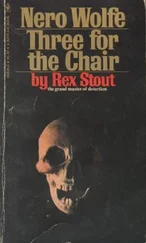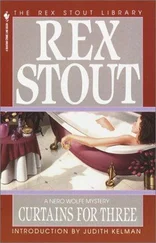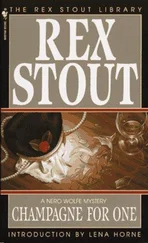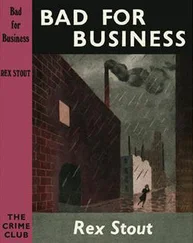A car had backfired.
No, it sounded more like a shot.
He moved again, walked faster and went into a jog, leaving the drive to make a bee-line for the house, still at a distance beyond intervening trees. He heard excited voices, shouts, and broke into a run. To his right, he saw a man running, headed also for the house, one of the guards loping like a camel with a revolver in his hand. The guard was aiming for the front entrance, but Fox, judging by the direction of the voices, swerved to the left, crossed an expanse of open lawn, crashed through some shrubbery, saw French windows standing open and kept going right on through them.
He was in the library. So were a dozen other people, including Ridley Thorpe, who was sprawled on his face on the floor, and also including Colonel Brissenden, on his knee besides Thorpe, barking as Fox entered, “He’s dead!”
Helen Gustava Flanders’ gloves had been the sixth surprise of the day. This was the seventh.
Two seconds of the silence of stupefaction followed the colonel’s announcement. Then there were sounds, the little noises that men and women make when sudden shock has stretched their nerves too tight, primitive throat noises older by geological epochs than the articulation of words. Under cover of that, Tecumseh Fox’s gliding movement as he made the door to the hall went unnoticed. Two women in maid’s uniforms were in the hall clutching each other; he ignored them and proceeded swiftly to the music room. He had his hand on the lid of the grand piano when he heard steps from the other direction and Nancy Grant entered, panting. She saw him and demanded, “What is it? Where’s Uncle Andy? He was yelling my name...” Fox pointed and said, “On through there,” and as her back passed from view he lifted the lid of the piano with one hand and took the gloves from his pocket with the other, thrust the gloves in beside the last bass string and let the lid down. Then he returned to the library and with a glance took it in.
Jeffrey Thorpe was standing with his toes almost touching the body on the floor, looking down at it, his face white and his mouth working. His sister was at his side, a little behind him, grasping his sleeve and looking not at the body but at him. Andrew Grant had his hands on his niece’s shoulders and was pushing her into a chair. Luke Wheer had his back flattened against a wall of books, his head bent and his eyes closed like a preacher leading a congregation in prayer. Bellows, the butler, had his hands clasped over his bosom, surely in unconscious imitation of a gesture seen in the movies. Henry Jordan sat on the edge of a chair, staring at what he could see of the form on the floor, rubbing his chin as though to get the lather in for a shave. Vaughn Kester’s rear, his back erect and rigid, was pressed against an edge of the desk; Fox couldn’t see his face. The two men whose talk Fox had interrupted in the music room, and three others whom he had not seen before, were grouped the other side of the stock ticker, which was still clicking away. A state trooper, bending over, was straightening up with something blue fluttering from his fingers. Brissenden barked at him:
“Put that down! Don’t touch anything!”
“It got kicked,” the trooper protested. “That man kicked it as he went across—”
“Put it on the desk! Don’t touch anything! Get everybody out of—”
“That’s mine!” It was a cry from Nancy. Brissenden whirled to her:
“What is?”
“That blue thing! That’s my scarf! How—” She started up from the chair, but her uncle’s hand on her shoulder kept her there.
“Well, don’t touch it! Nothing in this room is to be touched! Hardy, take them all — what are you doing?”
A man from the group behind the stock ticker had slid around to the desk and was extending an arm across it. Without arresting his movement he said in a thick determined voice, “I’m using this telephone.”
“No! Get away from there!”
The man said, “I’m phoning my office,” took the phone from the cradle and started to dial. Brissenden, beside him in two bounds, snatched the phone from him with one hand and with the other shoved him back so violently that he staggered and nearly fell.
“Break your neck,” said the colonel quietly. It was too serious for barking. “Kester, will you turn off that ticker? Thank you.” He surveyed the throng. “Thorpe’s dead. He was murdered. He was shot in the back and the gun that shot him is there on the floor. Everybody here heard the shot and one of you fired it. I know some of you are important people; one of you is so important that it’s more important for him to phone his office than for me to do my duty. You, come over here.”
The uniformed guard, with his revolver still in his hand, had finally found the spot and was standing by the windows. He tramped across.
“What are you, a Corliss man?”
“No, sir, the Bascom Agency.”
“Have you got any sense?”
“Yes, sir.”
“Use it. Hardy, take them all into the next room, the one with the piano. There’s to be no talking, no telephoning, and no leaving the room. If anyone gets tough, you will too. If anyone tries to leave, I instruct you to shoot their ankles off if you have to. This man will help you. If anyone goes to a bathroom, he will go along and no one will wash their hands. They will be examined to find out who has shot a gun. I’ll stay here and use this phone myself.”
Tecumseh Fox stated a fact, not aggressively, “You’re violating five or six statutes, Colonel.”
“Am I? Did you write them?”
“No, but I like them. You ought to be able to handle this job without declaring martial law. It gets me a little sore, that’s all. If I happen to feel like talking or washing my hands and I get shot in the ankle, you’re going to have some trouble with your own neck.”
“Are you refusing—”
“I’m not refusing anything, yet. I’m just saying I like the law. I’ll string along, within reason. You certainly have a right to clear this room, but it’s hot as the devil in the music room.” Fox encompassed the faces with a glance. “I suggest, ladies and gentlemen, that we go to the side terrace.”
A general movement started. Brissenden snapped:
“You! Butler! What’s your name?”
“B-b-bellows, sir.”
“Can you disconnect the phones so that this is the only one working?”
“Why, yes, sir.”
“Do so. Immediately.”
Bellows looked at Jeffrey and Miranda. Jeffrey took no notice; Miranda looked at Fox.
Fox shrugged. “Suit yourself, Mrs. Pemberton. The police have no legal control of any part of this house except this room in which a murder was committed. You may—”
“Damn you, Fox—”
“Take it easy, Colonel. I merely stated a fact. I was adding that Mrs. Pemberton may cooperate with you if she wants to.”
Miranda said, “Do as Colonel Brissenden asks, Bellows.”
“Yes, madame.”
The general movement was resumed and the colonel was left alone in the room with his job. Hardy and the Bascom man went along, looking grim but not too assured, for the migration, without halting in the music room, continued to the side terrace and that left them in embarrassing uncertainty regarding the proper procedure as to ankles in case of mutiny.
No mutiny arose. There was murmured and muttered talk, first among the business associates, but no washing of hands. The angular hollow-cheeked man went over to Fox and asked who he was, and Fox told him. The questioner gave his name in return, Harlan McElroy, and didn’t need to add that he was a director of the Thorpe Control Corporation as well as thirty others. Jeffrey sat scowling, lighting cigarettes and forgetting to smoke them; once his eye caught Nancy glancing at him and he started to get up, but dropped back again. Miranda and Vaughn Kester spoke together in undertones for a while, then Miranda disappeared into the house and soon after she returned maids came with luncheon trays. Fox ate his and the others did, more or less; but Luke Wheer and Henry Jordan ate nothing.
Читать дальше
